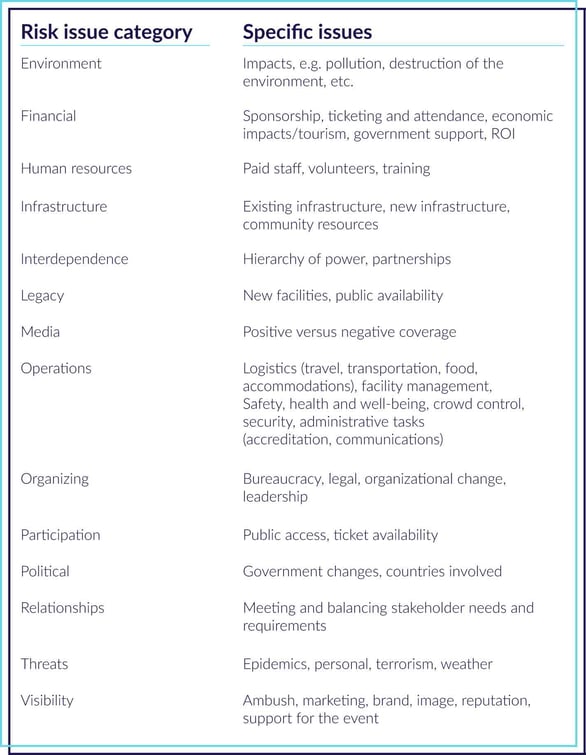Managing major events is difficult – it’s not for nothing that Olympic host cities have over five years to prepare for the next Games (incidentally, Los Angeles will have eleven to prepare for the 2028 Summer Olympics). For one, the level of risk they create is enormous, and not just security risk.
You see, managing major events means controlling risks that can emerge from virtually any aspect of the (usually) sprawling operation and negatively impact attendees (see the list below). For organizers, that major-event duty of care is, in fact, a legal obligation they owe to ticket holders, paid employees, and unpaid volunteers, alike.

But, of course, managing major-event duty of care isn’t simple, either. The publics whose safety must be guaranteed are usually large. And the standards for securing them tend to vary by locality, state, and nation. Luckily, there are some commonalities in major-event duty of care standards. For instance, many jurisdictions, as a baseline, will demand that organizers ensure that people are not exposed to risks arising from the operation.
The variance in major-event duty of care comes in compliance with those baseline protections, though. And here, measures for achieving (said) compliance can run the gambit. Nevertheless, major-event stakeholders will have to take any number of proactive steps to keep their publics safe, before, during, and after the event. We can’t detail all of them, but here are a list of important proactive steps to take in order to comply with your major-event duty of care obligations:
- Performing proper due diligence when obtaining a location and venue, i.e. determining whether the (appropriately-permitted) venue meets public safety requirements
- Conducting a thorough risk assessment, considering factors like the weather, wider environment, potential for fire, measures to keep children safe, etc.
- Creating an emergency action plan (EAP) for the event
- Informing attendees of potential threats at the event
- Developing critical emergency procedures for the event, i.e. evacuation strategies, as well as providing for medical assistance, security, and law enforcement
The list above is audience-agnostic. But major-event organizers, like all employers, are responsible for creating a safe operational environment for their crew, whether paid, volunteer, or third party. What organizers do on this front depends on the event in question. Generally, though, event organizers are obligated to (1) identify work-related hazards, prior to (2) working with stakeholders (including crew) to eliminate or mitigate those threats.
What’s more, in the case of major events, large crowds usually pose stark injury risk to crew. And so, crowd management planning must also be a part of major-event duty of care considerations. Some baseline crowd management guidelines include:
- Outline all potential dangers from mass gathering as part of a larger layout assessment of the venue
- Hire additional staff
- Contract trained security and crowd management personnel and/or police officers, or offer rigorous crowd management training to existing staff
- Ensure appropriate signage is visible and legible
- Appoint a worker to contact emergency responders if necessary
Effective crowd management is only one measure to ensure compliance with major-event duty of care obligations, though.
Sources:
Occupational Safety and Health Administration: OSHA Fact Sheet: Crowd Management Safety Guidelines for Retailers
University of Ottawa
---
For more great content from Noggin, visit our Resources Center.




